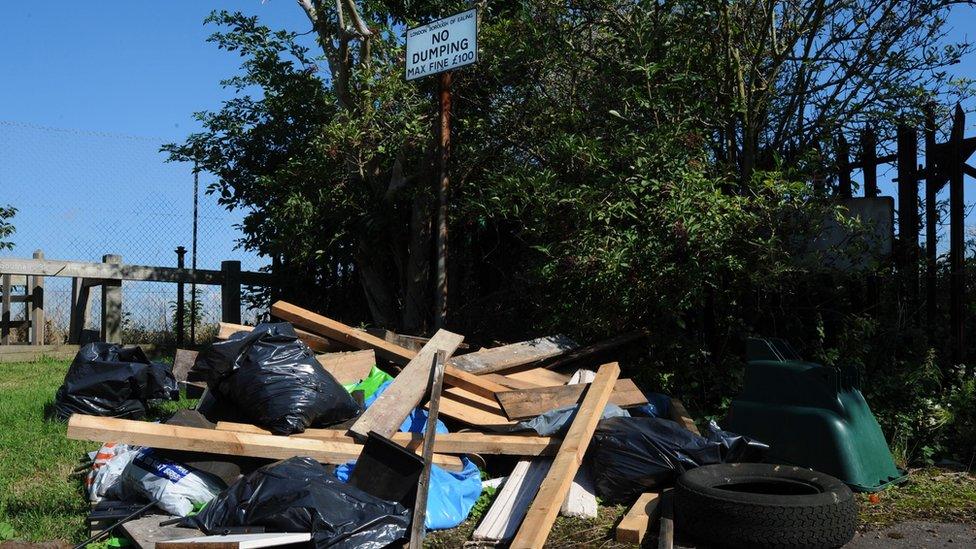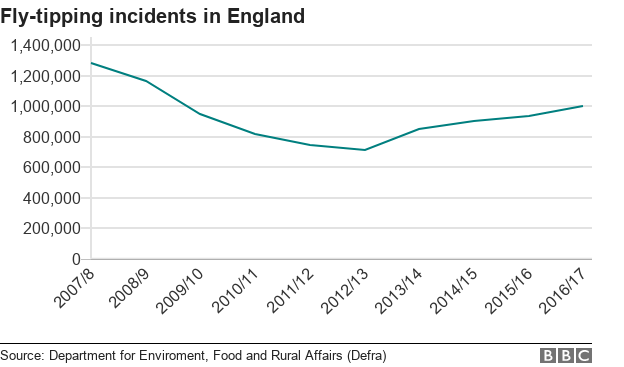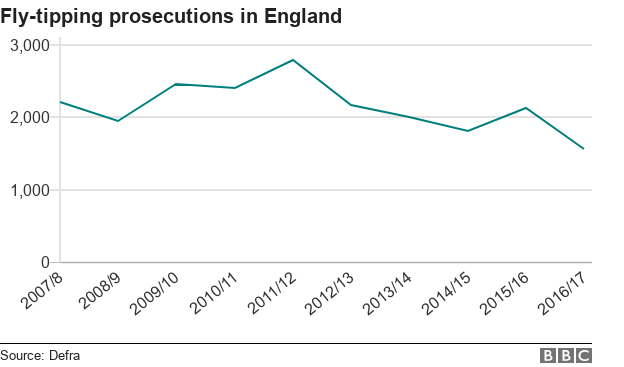Fly-tipping: Is it getting worse?
- Published

Fines could be imposed on people - without them being taken to court - if their rubbish ends up in an illegal tip, under a proposed new law.
The measure is being suggested as part of a government consultation, external to tackle fly-tipping in England and Wales.
Under the plans, households could be hit with a £400 maximum penalty for failing to take "reasonable measures" to ensure rubbish isn't being taken away by an "unauthorised person".
The move is meant to encourage people to check the Environment Agency (or Natural Resources Wales) online register to learn whether the person taking away their household rubbish is registered to do so.
Even though it's already illegal to allow an unauthorised person to remove domestic waste, issuing fixed penalties would be an alternative to going to court - which could save local authorities money in the long run.
Reality Check asked the government how many people have been previously prosecuted for this offence. We were told a breakdown of the different types of offences was not available.
Fly-tipping, as defined by the House of Commons Library,, external is "the illegal disposal of household, industrial, commercial or other 'controlled' waste without a waste management licence".
On the face of it, it's getting worse.
In the last financial year (April 2016 - March 2017) there were one million fly-tipping incidents in England, external - the equivalent of nearly 114 every hour,
That represents a 7% increase from the previous year and the fourth year in a row that fly-tipping has increased.
In Wales a similar trend was recorded. Local authorities reported 38,614 fly-tipping incidents, external, an increase of 6% on the previous year.

Not only is the number of incidents rising, but the number of prosecutions in England has fallen to a record low.
There were 1,571 fly-tipping prosecutions brought by English councils in 2016-17 - a significant decrease of 25% from the previous year.

But the prosecution data doesn't tell the full story.
Since May 2016, councils in England have been able to issue separate fines of up to £400, external for small scale fly-tipping offences.
In the 12 months after being given the new power, 56,000 fixed penalties were given out.
That's an increase of 56% from the previous year (when 36,000 were issued).
That means that for every one prosecution, 36 fixed penalty notices were issued.
But what's behind the increase in fly-tipping in the first place?
Unfortunately, that's a much harder question to answer.
According to the National Fly-Tipping Prevention Group,, external financial gains (or savings) are the main motivations for fly-tipping.
Others factors include "laziness and an attitude that someone else will clear up the waste".
Prof Simin Davoudi, an expert in environmental policy at Newcastle University, says a lack of local facilities and the cost of getting bulky items legally collected are to blame.
"A good example is Nottingham City Council," she said. "They have shown that fly-tipping can be reduced if local authorities collect some of these items free of charge. They introduced free collection and they have reduced fly-tipping in the city by nearly 42%."
But the Local Government Association, which represents councils, told Reality Check there was "no evidence" to link charging with an increase in fly-tipping.
The government says the apparent increase in fly-tipping over recent years may, in part, be because of more incidents being reported by local authorities as a result of new online reporting methods.


